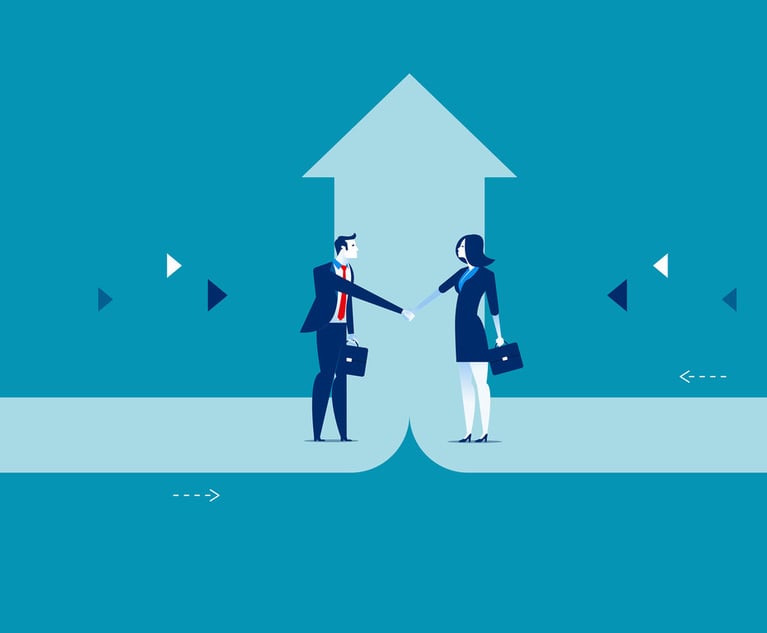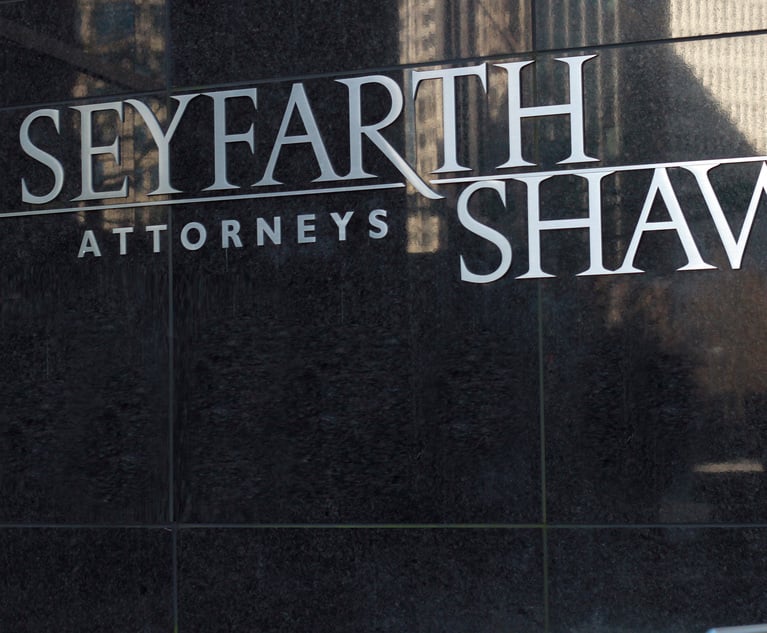 Image: Shutterstock
Image: ShutterstockSeeing Lawyers in Crisis, Some Blame the Billable Hour
Measuring lawyers by the hours they bill was long treated as a necessary evil. Faced with evidence that mental health erodes as hours increase, legal industry innovators are asking how necessary it really is.
May 19, 2019 at 07:00 PM
8 minute read
The original version of this story was published on Law.com
Alan Levin hears it all the time in his therapy practice: Lawyers say they're wracked with stress over targets for billable hours. Being short on hours often feels like an affront to their self-worth, says Levin, a former attorney.
 In her meetings with law firm associates seeking advice on how to avoid professional burnout, Paula Davis-Laack asks lawyers what would most to boost their well-being and help them thrive. The most common answer? Escaping the grip of the billable hour.
In her meetings with law firm associates seeking advice on how to avoid professional burnout, Paula Davis-Laack asks lawyers what would most to boost their well-being and help them thrive. The most common answer? Escaping the grip of the billable hour.
“I just hope that firms recognize that when you keep hearing the same message over and over and over again, it is an indicator that maybe new conversations need to start happening,” said Davis-Laack, a former Michael Best & Friedrich associate who is now founder and CEO of the Stress & Resilience Institute.
Big Law innovation evangelists have long offered arguments for ditching the billable hour, from competing with tech-savvy legal industry upstarts and other professional services firms to pleasing efficiency-focused clients.
But with the recognition that so many lawyers are crippled by stress, substance abuse and depression, some are making another argument: Scrapping allegiance to the traditional metric law firms use to judge performance and award compensation can improve attorneys' health and lives.
Today's young lawyers have more career options as the industry's service model has grown to include legal tech companies, alternative legal service providers and the Big Four accounting firms, which are increasingly hiring law school graduates. “Lawyers have more places [to work] and more options,” said Liam Brown, chairman of Elevate Services. “Now, you can have a career around a whole range of [new employers]: Legal consulting, legal operations, or law companies.”
But while those employers don't traditionally adhere to the billable hour, some of them may come with their own stresses, including potentially lower pay, the uncertainty of joining an untested company and the impermanence of paychecks in a “gig economy.” And for the vast majority of lawyers in private practice, the billable hour still rules.
Plenty of research suggests it's a model that is detrimental to lawyers' health.
A 2015 study titled “What Makes Lawyers Happy?” found that psychological predictors of well-being decreased as lawyers were required to bill more hours. Those lawyers with higher billable requirements cited less internal motivation, satisfaction and increased levels of alcohol abuse.
The study said the results were “an apparent example of managers undermining workers' self-determined motivation and well-being by promoting a focus on external rewards. Thus, as billable hours go up, income goes up and happiness goes down.”
A 2013 article in the journal Psychiatry, Psychology and Law found that 37 percent of Australian lawyers surveyed displayed moderate to extremely severe depressive symptoms and 35 percent screened positive for hazardous drinking. Among the survey respondents, lawyers who billed the highest number of hours experienced the worst psychological outcomes.
Global competition has increased the pace of work and law firms' focus on increasing profits has led to a “ratcheting up of billable hours, which has engendered stress and depression,” argues an article published in 2016 in the Griffith Law Review. Indeed, the 1958 American Bar Association pamphlet that is widely credited for introducing the billable hour suggested a 1,300-hours-a-year target. A billable hour more in line with today's expectations, around 2,200 hours, is 70 percent higher.
Colin James, a senior lecturer at the Australian National University who has researched connections between the billable hour and psychological health, concludes in a 2017 paper that the billable hour “may cause anxiety and mental health issues among employed lawyers, and contributes to the loss of good lawyers especially of women from the profession.”
Every year, dozens of mid-level associates tell The American Lawyer in its annual survey that they are displeased with the billable hour requirements.
“It is more stressful to operate in an environment with hours pressure when there are no clear guidelines about how to satisfy the partnership,” one associate said in the 2017 survey.
“I think talented associates who enjoy working in a law firm environment sometimes leave simply because in the long term they are not willing to accept the Big Law lifestyle in terms of hours [and] stress,” another wrote. “Conceivably the firm could do more to retain these kinds of people, but it might require structural changes affecting the economics of the firm and I do not see it happening.”
|Quantity vs. Quality
Clifford Chance recently made a step toward that end. The Magic Circle firm announced it would test a year-long pilot program in its Abu Dhabi and Dubai offices that would assess associates on metrics other than the billable hour.
The firm's chief operating officer, Caroline Firstbrook, said in a statement that measuring utilization “has a number of broadly acknowledged limitations,” including that it doesn't measure efficiency, nonbillable work that is beneficial to the firm's strategy and “excellent” client service. Firstbrook did not respond to a message asking if the firm had considered its lawyers well-being as part of the pilot or if it would track metrics related to that.
Critiquing the billable hour is nothing new, of course. In 2002, a group of Clifford Chance associates wrote a memo to the firm's leadership decrying a new requirement that they bill 2,200 hours a year. The memo labeled the requirement “profoundly unrealistic,” “dehumanizing” and “verging on an abdication of our professional responsibilities.”
Clifford Chance's response to the crisis that would be labeled “Paddinggate” was to ensure clients that associates had not been padding their bills to meet hours. But focusing on mental health has become less taboo in the intervening years.
Roger Furey, chair of Katten Muchin Rosenman, is one Big Law leader who sees a new talent model emerging as a result of increasing competition and more attention being paid to associates' desires.
“Some of the younger lawyers want to have a different career path other than grind, grind, grind,” Furey said. “And we can have associates who are not under a requirement to bill 2,200 hours a year. They will be just fine to take that trade-off. We can have happy people, smart lawyers, who we pay less money and we price them out at less.”
In order for that to happen, Furey said clients need to trust that alternative staffing models and billing processes within Big Law firms would not result in lower quality work. Clients sometimes cling to the billable hour out of fear that an alternative fee will be higher than a billable model, Furey said. It is incumbent on law firms to show clients data about how much similar work has traditionally cost, he said.
“There are ways to to get the same work done at a lower cost, but the clients have to trust law firms—or at least some law firms—will get that right without sacrificing quality,” Furey said. “And that's the exciting part. I know we can do it. And I hope we are one of the first firms to do it.”
Tim Batdorf, CEO of legal project management consultancy LegalBizDev, said his company has mostly pitched its services as a way to make legal work more reliable and its cost more predictable. But some law firms have discussed with him the idea that legal project management might be a way to control stress levels for associates. That is because one commonly cited cause of stress for young lawyers is an unreasonable workload, a lack of control over their work and a lack of guidance on how to accomplish it.
“We would take the position that legal project management addresses all of those things,” Batdorf said.
One thing that does not appear to be as motivating as some believe is more money—which is the most explicit reward for working more hours.
The study on lawyer happiness showed that junior partners in law firms reported the same levels of happiness as associates despite making nearly $70,000 more a year. And lawyers in firms with more than 15 attorneys reported significantly lower well-being scores than judges or lawyers in service-oriented positions.
“Simply stated, lawyers appear to be choosing to work in medium and large firms for the wrong reasons in psychological terms,” the study concludes, “and hence their happiness is impaired despite their enhanced income.”
That comes as no surprise to Levin, the lawyer-turned-therapist who now treats his fellow professionals. He said he frequently asks unhappy lawyers if they would be willing to trade 50 to 75 percent of their salary to be working in a setting where colleagues were emotionally supportive and collaborative.
“Every single one of them says, 'Of course. Yes I would,'” Levin said. “Because the quality of our lives as people is far more important than how much money we make.”
This content has been archived. It is available through our partners, LexisNexis® and Bloomberg Law.
To view this content, please continue to their sites.
Not a Lexis Subscriber?
Subscribe Now
Not a Bloomberg Law Subscriber?
Subscribe Now
NOT FOR REPRINT
© 2025 ALM Global, LLC, All Rights Reserved. Request academic re-use from www.copyright.com. All other uses, submit a request to [email protected]. For more information visit Asset & Logo Licensing.
You Might Like
View All

New Year, New Am Law 100: Challenges Await These Newly Merged Law Firms
7 minute read
Trending Stories
- 1Restoring Trust in the Courts Starts in New York
- 2'Pull Back the Curtain': Ex-NFL Players Seek Discovery in Lawsuit Over League's Disability Plan
- 3Tensions Run High at Final Hearing Before Manhattan Congestion Pricing Takes Effect
- 4Improper Removal to Fed. Court Leads to $100K Bill for Blue Cross Blue Shield
- 5Michael Halpern, Beloved Key West Attorney, Dies at 72
Who Got The Work
Michael G. Bongiorno, Andrew Scott Dulberg and Elizabeth E. Driscoll from Wilmer Cutler Pickering Hale and Dorr have stepped in to represent Symbotic Inc., an A.I.-enabled technology platform that focuses on increasing supply chain efficiency, and other defendants in a pending shareholder derivative lawsuit. The case, filed Oct. 2 in Massachusetts District Court by the Brown Law Firm on behalf of Stephen Austen, accuses certain officers and directors of misleading investors in regard to Symbotic's potential for margin growth by failing to disclose that the company was not equipped to timely deploy its systems or manage expenses through project delays. The case, assigned to U.S. District Judge Nathaniel M. Gorton, is 1:24-cv-12522, Austen v. Cohen et al.
Who Got The Work
Edmund Polubinski and Marie Killmond of Davis Polk & Wardwell have entered appearances for data platform software development company MongoDB and other defendants in a pending shareholder derivative lawsuit. The action, filed Oct. 7 in New York Southern District Court by the Brown Law Firm, accuses the company's directors and/or officers of falsely expressing confidence in the company’s restructuring of its sales incentive plan and downplaying the severity of decreases in its upfront commitments. The case is 1:24-cv-07594, Roy v. Ittycheria et al.
Who Got The Work
Amy O. Bruchs and Kurt F. Ellison of Michael Best & Friedrich have entered appearances for Epic Systems Corp. in a pending employment discrimination lawsuit. The suit was filed Sept. 7 in Wisconsin Western District Court by Levine Eisberner LLC and Siri & Glimstad on behalf of a project manager who claims that he was wrongfully terminated after applying for a religious exemption to the defendant's COVID-19 vaccine mandate. The case, assigned to U.S. Magistrate Judge Anita Marie Boor, is 3:24-cv-00630, Secker, Nathan v. Epic Systems Corporation.
Who Got The Work
David X. Sullivan, Thomas J. Finn and Gregory A. Hall from McCarter & English have entered appearances for Sunrun Installation Services in a pending civil rights lawsuit. The complaint was filed Sept. 4 in Connecticut District Court by attorney Robert M. Berke on behalf of former employee George Edward Steins, who was arrested and charged with employing an unregistered home improvement salesperson. The complaint alleges that had Sunrun informed the Connecticut Department of Consumer Protection that the plaintiff's employment had ended in 2017 and that he no longer held Sunrun's home improvement contractor license, he would not have been hit with charges, which were dismissed in May 2024. The case, assigned to U.S. District Judge Jeffrey A. Meyer, is 3:24-cv-01423, Steins v. Sunrun, Inc. et al.
Who Got The Work
Greenberg Traurig shareholder Joshua L. Raskin has entered an appearance for boohoo.com UK Ltd. in a pending patent infringement lawsuit. The suit, filed Sept. 3 in Texas Eastern District Court by Rozier Hardt McDonough on behalf of Alto Dynamics, asserts five patents related to an online shopping platform. The case, assigned to U.S. District Judge Rodney Gilstrap, is 2:24-cv-00719, Alto Dynamics, LLC v. boohoo.com UK Limited.
Featured Firms
Law Offices of Gary Martin Hays & Associates, P.C.
(470) 294-1674
Law Offices of Mark E. Salomone
(857) 444-6468
Smith & Hassler
(713) 739-1250







